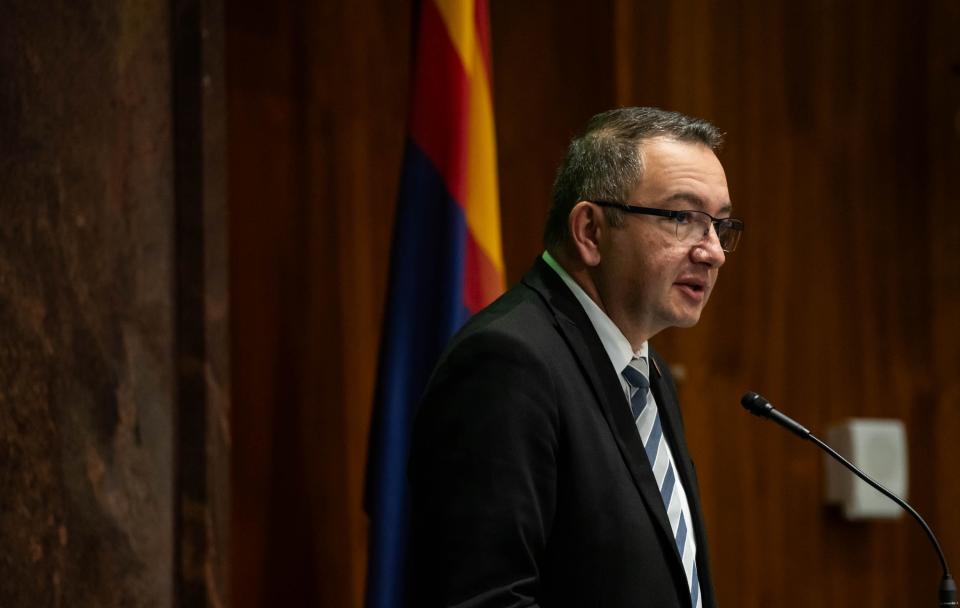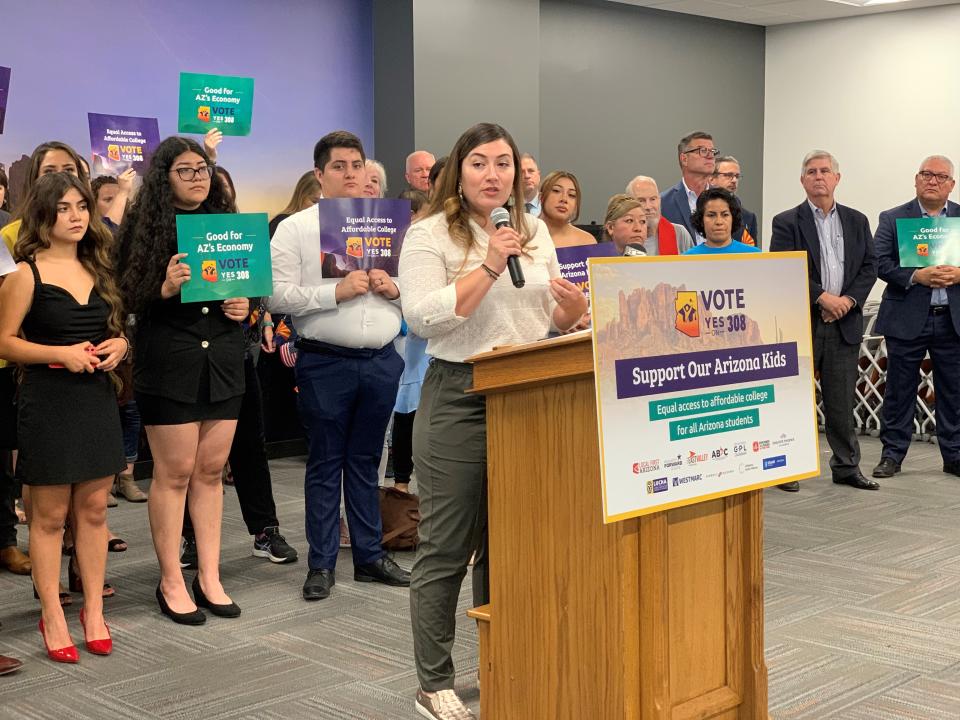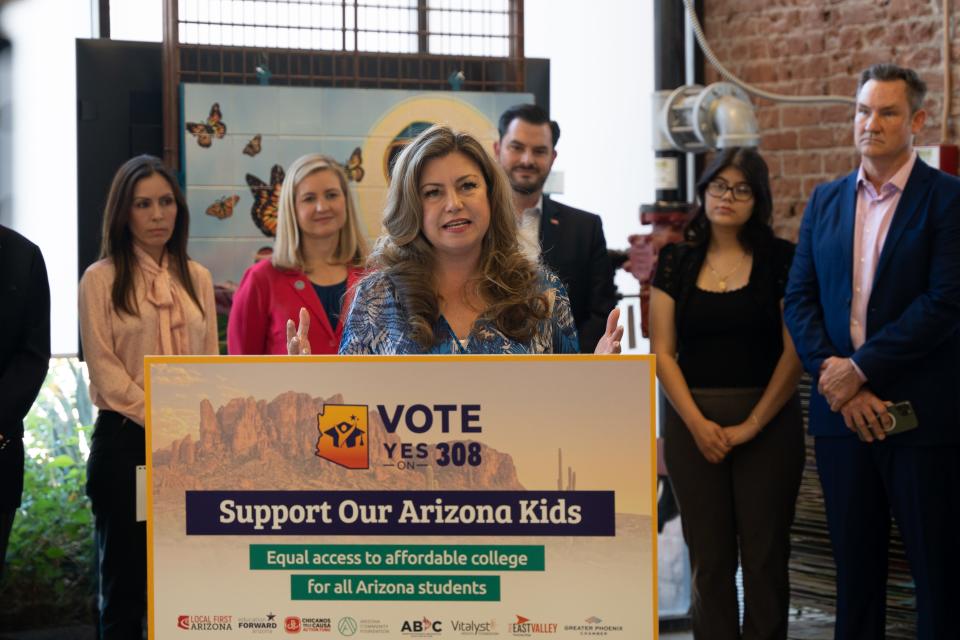New immigration law would devastate Arizona's economy, opponents say. The numbers say otherwise
Activists, businesspeople and Democratic lawmakers warned Monday about the potential harm to immigrant communities and the state if voters approve a measure to limit undocumented residents' ability to work.
At a news conference at the state Capitol's Rose Garden, opponents of the new House Concurrent Resolution 2060 claimed the state was heading in the same direction as in 2010, when the state's reputation and economy took a hit from Senate Bill 1070.
The law enabled local police to act as immigration officers. It resulted in a number of boycotts against Arizona and an unknown number of undocumented workers leaving the state. Much of the law was held unconstitutional in subsequent court battles, but police still have limited ability to question the immigration status of people they encounter.

The new measure from Arizona House Speaker Ben Toma would require state, county and municipal governments to use the federal E-Verify system to check the immigration status of anyone who applies for a license of any kind. It adds a requirement for employers to use the system when hiring independent contractors and subcontractors. A 2006 law already requires employers to check out new hires with E-Verify. Employers who intentionally avoid using the system could face fines of up to $10,000 for each unauthorized worker.
Alex Gomez, executive director of the immigrant rights group Living United for Change in Arizona, recalled the post-SB 1070 "devastation" for Latino families in "an incredible state of hate." Immigrants were "persecuted in the streets, at checkpoints, and asked for their papers" before deportation. In a news release last week, LUCHA said "Arizona lost billions of dollars in revenue" because of SB 1070.

Jose Rivera, owner of the Tres Leches Cafes in Phoenix, was one of two business owners who spoke at the news conference, saying proposals like Toma's "sends a chilling message to immigrant entrepreneurs like myself that we're not welcome."
There's little question that SB 1070 and a 2006 law requiring employers to use E-Verify broke up families, caused thousands of undocumented residents to leave Arizona and encouraged politicians like former Maricopa County Sheriff Joe Arpaio to target the immigrant community with heavy enforcement. But in making their point, opponents of the potential law overstated the economic effect of an even stricter 2010 law.
Arizona Hispanic Chamber of Commerce CEO Monica Villalobos said Toma's plan for a ballot measure and bills by other Republican lawmakers would have an "economic impact of $2.5 billion" and could mean "30,000 jobs lost throughout Arizona." Such policies would cost Arizona "several hundreds of millions of dollars, as we witnessed in 2010 with SB 1070."
Villalobos later acknowledged the $2.5 billion figure and 30,000 tourism-related jobs referred to the yearly economic impact of Mexican tourists in Arizona, and that she didn't mean to imply Toma's proposal would erase that impact.

Experts described the law's overall effect to the state as negligible in a retrospective article in The Arizona Republic three years ago. Conventions and some entertainment venues felt a severe impact as activist groups and several states enacted boycotts on Arizona and its goods.
Villalobos and others pointed to a 2010 study commissioned by the liberal Center for American Progress and conducted by the Arizona-based Elliot Pollack & Company that detailed some of the negative effects. It estimated the state lost $141 million in direct spending by convention attendees, $86.5 million in lost wages, and about $9.4 million in missing tax revenues. The total economic loss constituted about 1/1000th of the state's annual economic output, which was around a quarter of a trillion dollars.
Yet after the report came out, Pollack and other economists disagreed with the exaggerated conclusions of activist groups using the study to attack the 2010 law. For instance, convention business fell by about 30% in 2012, but economists said part of the reason was that the Legislature shrunk the state's tourism budget.
"Nothing I said has changed in all that time," Pollack said this week. "Did it have an effect? Yes. Was it a significant effect? No."
Tourism statistics from 2009 to 2022 provided by the Arizona Tourism Bureau show a steady rise each year in the number of tourists — from 36.6 million in 2010 to 46.8 million in 2019. No downturn trend can be seen in the numbers until the 2020 coronavirus pandemic.
State tax revenue from 2009 to 2016 shows steady upward progress, except for a decline in the state's fiscal year 2013. Any effect from SB 1070 has been overshadowed by the much worse effects of the Great Recession. Tax revenue in Arizona recovered slowly, speeding up in 2017 before the sharp fall during the 2020 pandemic.
Despite the raw feelings many felt due to the enforcement of SB 1070, Latinos were the fastest-growing segment of the state's population from 2010 to 2020.
Toma, who introduced the new measure last week, called it "one of the toughest immigration laws ever written." He immediately began using it to fundraise for his run for office in Arizona's 8th Congressional District.
Republicans passed the resolution out of the House on party lines last week, and it will now move to the Senate. If Republicans OK the measure there, it will go to the 2024 ballot without requiring a signature by Democratic Gov. Katie Hobbs.
Overall, the influx of millions of new immigrants under Biden's reign is expected to help the economy in the next decade, according to a report by the Congressional Budget Office. However, the report shows a likely "modest" downturn in wages because of the extra labor.
Pollack said immigrants can help with a national labor shortage and hopes to see the immigration system improved. But even if voters approve Toma's plan, a negative effect would not be "highly measurable" on the economy because of many other factors that cause people to move to the state.
Reach the reporter at [email protected] or 480-276-3237. Follow him on X @raystern.
This article originally appeared on Arizona Republic: Would new Arizona immigration laws ruin economy? SB 1070 didn't
